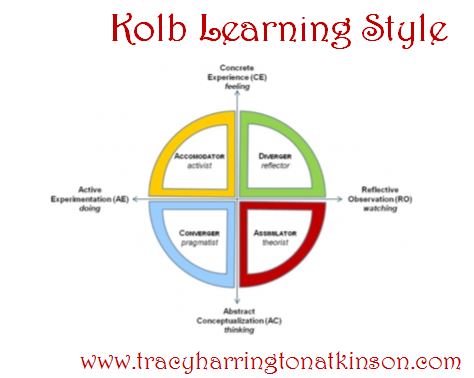David Kolb, the developer of Kolb Learning Styles, based his theory on the research of Jung, Rogers and even Piaget. The Kolb Learning Style Model is divided into four different styles which derive from a four stage learning cycle. This learning theory provides an understanding not just of individual learning styles based on the four quadrants but also explains a cycle of learning that can be applied to all learners.
 Kolb’s Learning Styles are split into four general types including diverger, assimilator, converger and accommodator with two dimensions. The diverger learner is both concrete and reflective. These learners search for the answers to why and how. They learn best by observing and gathering information, avoiding conflict when possible.
Kolb’s Learning Styles are split into four general types including diverger, assimilator, converger and accommodator with two dimensions. The diverger learner is both concrete and reflective. These learners search for the answers to why and how. They learn best by observing and gathering information, avoiding conflict when possible.
An assimilator prefers the most logical course of action with their strength being thinking and reflecting over acting. Logic, organization and a strong sense of control are essential characteristics for assimilators. They benefit most when given time to reflect on new information.
Convergers also prefer to work alone but with their ideas. They search for well-defined tasks and learning by trial and error. This type of learner is an expert problem solver although they prefer to learn alone.
Lastly, accommodators are people oriented. They are the extrovert of the Kolb Learning Styles. Accommodators are action-oriented and task motivated. They are creative in their learning process taking risks while avoiding routine. Feeling and intuition have great value to these learners (McGill University, 2017; Pritchard, 2009).
Sources:

For other learning styles: MBTI Learning Styles – A Practical Approach Available in paperback; Kindle; and pdf versions
McGill University. (2017). Learning Styles. Retrieved from https://www.mcgill.ca/thewelloffice/resources/yourwellness/academic/learning-styles
Pritchard, A. (2009). Ways of learning: Learning theories and learning styles in the classroom (2nd ed.). New York, NY:Routledge.
Tracy Atkinson, mother of six, lives in the Midwest with her husband. She is a teacher, having taught elementary school to higher education, holding degrees in elementary education and a master’s in higher education. Her passion is researching, studying and investigating the attributes related to self-directed learners. She has published several titles, including Calais: The Annals of the Hidden, Lemosa: The Annals of the Hidden, Book Two, Rachel’s 8 and Securing Your Tent. She is currently working on a non-fiction text exploring the attributes of self-directed learners: The Five Characteristics of Self-directed Learners.


Comments are closed